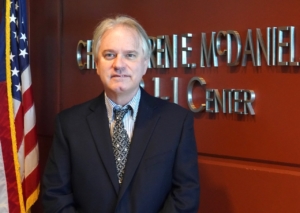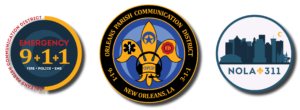OPCD Cybersecurity Spotlight
Karl Fasold
For Cybersecurity Awareness Month, OPCD has been excited to spotlight the members of our Technology Department leadership team, who spend their days and nights ensuring that all technological aspects of New Orleans 9-1-1 and NOLA-311 are fully functional and operational 24 hours a day, 7 days a week.
Join us was we close out Cybersecurity Month with the OPCD Technology Department director, as he gives a sneak peek into their world of encryption, virus protection and data security. Not only will this interview give us a chance to learn about who he is and what he does to protect the agency from cyber-attack, we’ll also find out how to better protect your data and devices from things like ransomware, phishing and malware from the people who do it for a living.
Our final spotlight goes to OPCD’s Director of Technology, Karl Fasold.
 OPCD Cybersecurity Awareness Month Technology Director, Karl Fasold
OPCD Cybersecurity Awareness Month Technology Director, Karl Fasold
Karl, who has worked at OPCD for 17 years, grew up during a revolutionary time in technology. Self-describing himself as a ‘geek’ in high school, Karl’s fascination with the early introduction of personal computers created the baseline for his decision to pursue a career in technology. “I immediately decided I wanted to know more about computers,” said Karl. “When I enrolled at Loyola University New Orleans, I majored in Computer Science and worked at a startup while still in school. After graduation, I spent more than 20 years in software development within the private sector before starting at OPCD. I really love what I do, and count myself lucky to have enjoyed such a long and successful career in this field.”
When it comes to keeping your devices safe, Karl believes it’s all about instinct. “Computer safety is similar to being safe as a tourist,” said Karl. “ You have to trust your gut. If something seems suspicious don’t try to ‘reason it away.’ Figure out what seems out of place and ask for help. And don’t go to sketchy places! [Note: Karl defines a sketchy website as any site you wouldn’t want your mom to know about you visiting.]”
In a world where the internet reigns supreme, users have to stay vigilant against cyber-attack. “Unfortunately, people have become way too trusting of the internet, social media, and email,” said Karl, “and the bad guys are making money off of that every day. Before opening an attachment or following a link,” Karl continued, “ask yourself WHY the alleged sender would send it to you. If you are at all suspicious, contact them offline to verify the point of contact.
Some cyber-attacks look realistic enough until you dig just a little deeper. Let’s say you receive a text from your bank saying you need to update your password through the link provided in the text or you will be locked out of your accounts. Seems reasonable enough. Definitely scary enough. Karl thinks we should take a more pragmatic approach when dealing with scary situations like this, though. “Your bank has your home address, likely several phone numbers for you and knows all your account information,” Karl explained. “Why would they send you a non-descript text to ‘update your password by link immediately or your accounts will be locked’, rather than either locking the accounts themselves or contacting you via multiple channels simultaneously?
The last time a fraudulent charge was made on my account,” Karl continued, “the bank knew before I did, froze the account and contacted me via my registered email, text, and voice calls asking me to call them at the number on the back of my card.”
There are numerous ways that users can be better protected. “Step one is backing up your computers and devices,” said Karl. “There are so many affordable cloud services backup options now, there’s really no longer an excuse to not back up your devices. “Protect yourself further by never using public computers or public networks to perform sensitive activities,” said Karl, “banking, credit cards, paying bills, etc.”
“Above all, protect your passwords,” Karl said. “Do not give your passwords to ANYONE. When creating your passwords, remember to always use complex passwords (more than 8 characters, with both upper and lowercase letters, numbers and special characters) and don’t use the same passwords for multiple sites. A password management app is very simple to use and makes it easy to have different passwords for everything.”
Alongside using complex passwords another familiar and easy way to protect yourself is by keeping your devices updated. “A news story broke out recently about a vulnerability in Apple iOS software regarding internal picture rendering software,” continued Karl. “This vulnerability could allow an attacker to compromise the device by simply sending a text message to it with a specially crafted picture. The owner didn’t need to open or look at the picture either, simply receiving the picture was enough. This vulnerability was very scary and the only way to fix it was by updating to the most recent version of iOS. While these things can be troubling, there is often an easy way to protect yourself. And I have to admit, this type of constant change and evolving landscape of software and systems keeps me fresh and engaged each day. It’s why I chose this career, and why I love my work. I truly enjoy identifying and finding solutions for technological issues.”
When not sharing advice on how to prevent breaches in cybersecurity Karl is working with the rest of his tech team. “The entire team goes above and beyond routinely and it’s difficult to ever single an individual out above the rest,” said Karl. “I am however most proud of our response to hurricane Ida, where we faced a number of issues and problems, none of our making. We constantly had to twist, turn, and flex to ensure our citizens and visitors could get the help they needed. My team stepped up continually to parry every problem and resolve them as quickly as humanly possible. It gives me great pride to say our continual activities to make things better ensured that none of the issues were failures of OPCD’s systems. I consider it an honor to work with my team and an honor to #SHOWUP every day at OPCD.”
Outside of OPCD, Karl enjoys spending his time relaxing and catching up on rest. “I enjoy sleeping in, said Karl, laughing. “I have two wonderful daughters who are now in their twenties. I don’t think I’ll ever be able to catch up on all the sleep I missed while they were growing up. I moved to the city for college and love it so much that I enjoy just being here the most. It’s like nowhere else on earth!”
We hope that Karl can get plenty of rest this weekend and appreciate him for closing out our Cyber Security Awareness Month spotlight. Though it is no longer October, we felt it was appropriate to allow the spotlight into November because cyber security threats are a year-round obstacle.
Thank you again, Karl, for your dedication to your work, team and for taking a moment to help us stay safer when it comes to cybersecurity. We are proud to have you and everyone on the OPCD Technology Team supporting the City of New Orleans and our Heroes Under the Headset.
If you enjoyed learning about OPCD Technology Department Director, Karl Fasold and ways to avoid phishing snares, share this article on your social network so others can enjoy it as well. We thank you for tuning into our interviews with our technology leadership team during Cybersecurity Awareness Month and hope that you all have learned some great tips and tricks to keep yourself and your data a little safer.

